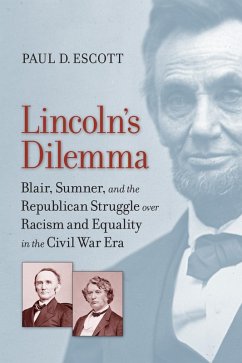The Civil War forced America finally to confront the contradiction between its founding values and human slavery. At the center of this historic confrontation was Abraham Lincoln. By the time this Illinois politician had risen to the office of president, the dilemma of slavery had expanded to the question of all African Americans' future. In this fascinating new book Paul Escott considers the evolution of the president's thoughts on race in relation to three other, powerful--and often conflicting--voices.
Lincoln's fellow Republicans Charles Sumner and Montgomery Blair played crucial roles in the shaping of their party. While both Sumner and Blair were opposed to slavery, their motivations reflected profoundly different approaches to the issue. Blair's antislavery stance stemmed from a racist dedication to remove African Americans from the country altogether. Sumner, in contrast, opposed slavery as a crusader for racial equality and a passionate abolitionist. Lincoln maintained close personal relationships with both men as he wrestled with the slavery question. In addition to these antislavery voices, Escott also weaves into his narrative the other extreme, of which Lincoln was politically aware: the virulent racism and hierarchical values that motivated not only the Confederates but surprisingly many Northerners and which were embodied by the president's eventual assassin, John Wilkes Booth.
Sumner, Blair, and violent racists like Booth each represent forces with which Lincoln had to contend as he presided over a brutal civil war and faced the issues of slavery and equality lying at its root. Other books and films have provided glimpses of the atmosphere in which the president created his Emancipation Proclamation. Lincoln's Dilemma evokes more fully and brings to life the men Lincoln worked with, and against, as he moved racial equality forward.
A Nation Divided: Studies in the Civil War Era
Dieser Download kann aus rechtlichen Gründen nur mit Rechnungsadresse in A, D ausgeliefert werden.

